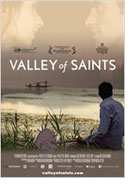

Opening 17 Jan 2013
Directed by:
Musa Syeed
Writing credits:
Musa Syeed
Principal actors:
Mohammed Afzal, Gulzar Ahmed Bhat, Neelofar Hamid
Gulzar (Gulzar Bhat) works as a tourist boatman and has sole responsibility for his aged uncle and their ramshackle dwelling on the man-made island in Dal Lake. His uncle departs to a distant family celebration; Gulzar excitedly meets his best buddy Afzal (Afzal Sofi). They have saved enough money between them for bus tickets out, “to start a whole new life”.
Unexpectedly, a one-week military curfew is imposed; another island inhabitant phones, asking good-hearted Gulzar to take care of the person staying in his houseboat. Asifa (Neelofar Hamid) is completing her environmental research that focuses on the lake’s cataclysmic pollution, and since the guys are forced to bide time, they assist her. Whereas Afzal is clumsy and somewhat resentful, Gulzar finds both Asifa and her work fascinating; she hires Gulzar as a guide. An ensuing rivalry threatens Gulzar and Afzal’s friendship and their plans. Torn, the fateful events allow each one time to reevaluate his life and what is most important.
Filmed on location in Kashmir, Dal Lake and its residents and the concurrent military curfew footage play a strong role. Escalating violence in the area, the worst in a decade, forced American director Musa Syeed to improvise in his debut feature film. Syeed describes Gulzar as a “sensitive soul”; being a Dal Lake resident and boatman, he was the crews’ entry into the community, arranging for transportation, props and locations. Afzal’s energy and presence attracted Syeed; when Afzal helped coach Gulzar, the chemistry that developed between them was the catalyst that caused Syeed to rework the story around the two young men’s friendship. Only Neelofar is a trained actress. Because there are no cinemas in Kashmir, it was memorable for the actors to see the film on a big screen for the first time at Filmfest Hamburg 2012 when it opened the festival. The location and its inhabitants have a mesmerizing effect, embellished by Kashmiri-American Mubashir Mohi-ud-Din’s original haunting music. Syeed summarizes the film’s message with, “we can’t always get back what is lost, but we can nurture what remains.” (Marinell Haegelin)